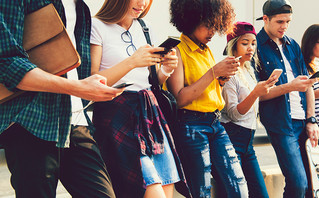It is a fact that the pandemic has affected human relations. In particular, the generation Zi.e. the people who are born between 1995 – 2010was at the height of her socialization and he was forced to stay in quarantine for three yearscutting off any physical presence with her company and loved ones.
It was only natural that relationships would be affected. Some got lost, some stopped hanging out with each other and all this resulted in one being noticed loneliness among Gen Zers. The insider.com interviewed 23 young adults aged 21 to 27 about their experiences of loneliness and found that people of this generation are forced to spend more money in order to make acquaintances.
For example, during the pandemic, the Lynette Ban moved to Austin from New York to save money. But now, three years into her telecommuting, has created a new outlet: friendships. Ban estimates that she spends at least $500 per month in various subscriptions and events aimed at making friends and maintaining relationships. “After the pandemic, I started prioritizing clubs and participating in organizations. There I can meet new people and to build a network this wayBan said.
Ban, 26, is like many Gen Zers who they have spent a significant part of their lives outside of classrooms, offices and other communal spaces where offline relationships are so often formed. This has led, in part, to what Dr. Vivek Murthy has called “epidemic of loneliness».
Gen Z loneliness is so bad that some young adults are spending thousands trying to make friends through gym memberships and social clubs https://t.co/5khex3TJ80
— Business Insider (@BusinessInsider) September 25, 2023
What is the “loneliness epidemic” that plagues young people?
The problem is particularly acute among young people. More than a third of Americans aged 18 to 25 reported that they felt lonely often, almost all the time or all the time during the 30 days preceding a December 2022 survey conducted by the Harvard Graduate School of Education.
Richard Weissbourd, a child and family psychologist who worked on the study, told Insider that 18- to 25-year-olds reported “loneliness” more than any other demographic group. “This is the time when young people are making some of the hardest decisions of their lives and they really need support,” said Weissbourd.
Loneliness is not just a problem mental health. Social isolation can be just as dangerous as smoking up to 15 cigarettes a day and contributes to health problems including cardiovascular disease, stroke and dementia, Murthy wrote in a recent report.
Insider’s Loneliness Survey
20 of the 23 survey participants said that they are spending more money now than before the pandemic on activities, like art classes and gym memberships to make friends. In turn, many stated that spend less money on personal expensessuch as individual travel or television subscriptions.
Money can’t buy Gen Zers happiness, but they hope it can buy them friends. Many young adults, especially those who work remotely, try to combat loneliness by picking up new hobbies and activities to meet new people. “Not having that social experience in the office shrinks your social circle, and especially when you’re young, it is so important to have this teamsaid Matt Schulz, head of LendingTree.
William Cabell, 24, pays $70 a month for a membership to a climbing gym and another $161 to a jiu jitsu gym in Richmond, Virginia. Cabell’s goal with both memberships is to meet new people. “To make friends, you need normality,” Cabell said.
In addition to the gyms, the art studios have also seen an increase in Gen Z visitors. Barley Vogel, owner and director of Studio Arts Dallas, said the number of younger adults attending the studio’s classes has increased.
Rebecca Schweiger, founder of The Art Studio NY, told Insider that Gen Zers “attend classes regularly to satisfy their need for a sense of community and connection». Often, young adults come alone looking for companionship in addition to personal fulfillment, he said. “It’s quite common for adult students to make friends, socialize, get to know each other first in the classroom and then meet outside of the classroom,” Schweiger said.

The case of Noureen Shallwani
Noureen Shallwani, 27, who works for a beauty technology company, said she felt she had to do a “social reboot” after moving from Austin to Philadelphia for a personal job last year. Shallwani joined Facebook groups to find people willing to watch movies or go out to eat with her. She regularly attends pilates classes to meet people and saves to afford holidays with friends.
“Being in an environment where everyone feels like they’ve done a workout together, that everyone’s been through an experience together, it made life a little easierShallwani said. “You talk afterwards, and everyone’s like, ‘Should we go for a drink this time?’ or “There’s an event in town, do we all want to go there?”

Gen Zers are also finding cheaper ways to solve loneliness
Some Gen Zers don’t have the money – or the will – to spend thousands of dollars a year on activities and memberships designed to make friends. For example, 27-year-old Lillian Lema said she spent a Sunday in August eating and enjoying music with friends on Peaks Island in Maine. They participated in the meeting three people he met last year through an app intended to encourage relationships.
Lema was lonely after a breakup, working a hybrid job for a retail company and living at home. “The fact that I’m still in touch with this person I met through an app a year ago, and then I’m introducing her to new people, and so is she, makes me feel good“, he said.
Source: News Beast
With 6 years of experience, I bring to the table captivating and informative writing in the world news category. My expertise covers a range of industries, including tourism, technology, forex and stocks. From brief social media posts to in-depth articles, I am dedicated to creating compelling content for various platforms.







